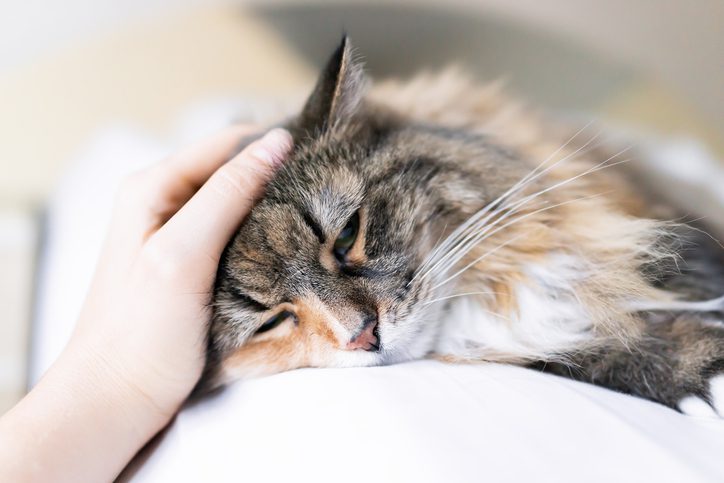Can Cats Have Asthma in Raleigh, NC?
Yes, believe it or not cats can have asthma. Most humans are familiar with asthma but did you know it affects 1-5% of cats? It’s true. Asthma is a serious, chronic, and life-long illness, even in mild cases.
When it comes to asthma, the treatment goal is risk reduction as well as control of symptoms. If left untreated the symptoms can worsen. Cases can range from mild to life-threatening. There is no real cure for asthma but there are many ways to minimize the effects. The management of respiratory conditions is crucial to overall health. After all, breathing is pretty important.
The Symptoms of a Cat with Asthma
Asthma is a disease of the lungs. Inflammation in the airways makes it harder to breathe and the irritation and swelling results in decreased air flow and excess mucus. A cat with asthma might not be as obvious as a human with asthma, but there are clear signs to look out for:
- Coughing and hacking often with a hunched body posture with the neck stuck out close to the ground. This can be mistaken for a cat trying to cough up a hairball.
- Difficulty breathing, rapid or open-mouthed breathing, wheezing
- Foamy mucus, vomiting
- General lethargy
All animals experience and exhibit asthma differently, as the cases range from very mild to deadly. But even mild asthma over time could cause health implications for a cat.

The Cause:
Asthma in general, and specifically in cats, is most often caused by allergies. When an asthmatic being breathes in allergens the lungs go into allergy inflammation overdrive.
Allergies are an overreaction of the body’s immune system to allergens. Allergens are usually proteins from plants and animals, such as dander or pollen. Over time, exposure to these allergens can cause sensitivity and unnecessary reaction. Histamines are released in this reaction which begins inflammation. Inflammation leads to constricted and blocked airways which results in trouble breathing.
Asthma will usually develop between the ages of two to eight years and affect more females than males. Some studies show that Siamese or Himalayan cat breeds and mixes are more prone to asthma. Although allergies are the common problem, many factors come into play. Ordinary and sometimes unavoidable household environments can contribute to asthma. Mold, cat litter dust, a pre-existing heart or lung condition, parasites, and obesity all play into a cat’s asthma. These can cause asthma in general or contribute to worse asthma.
Even stress can worsen a cat’s asthma. Using perfume, aerosol spray, room fresheners, certain cleaning products, etc. can increase asthma. Fireplace smoke and dust aren’t great either. And cigarettes absolutely contribute to asthma, and a cat who already experiences asthma should never be around cigarette smoke. There are many factors to cat asthma and each should be explored and addressed.
The Treatment:
It might seem unquestionable that a cat has asthma, but a vet will often run many tests to decide on a diagnosis. This will likely include blood work, radiographs, and evaluation of bronchial secretions as well as checks for parasites.
It is crucial to diagnose correctly, for a misdiagnosis could mean the cat is given treatment for asthma while another lung disease or lung parasites go untreated. And vice versa. A cat treated for bronchitis who really has asthma will not do well either. Many other health issues can look like asthma and so a trained vet should be the only person to diagnose your cat.
As asthma has a cause but no real cure, the treatment is to suppress the symptoms. The usual treatment for asthma in cats is corticosteroids. Corticosteroids help to reduce inflammation in the lungs usually caused by allergies. The body naturally produces a hormone called cortisol. This hormone’s function is to break down sugars and reduce inflammation and subsequent swelling. Sometimes the body is unable to make enough cortisol to fight allergies or an asthma attack.
The synthetic hormone given to cats with asthma is made to mimic the naturally occurring cortisol. As asthma is an overreaction of a body’s immune system, the corticosteroid helps to suppress the immune system’s response. If left to overreact, the body’s immune system starts to fight itself. It will attack healthy cells, resulting in the swelling, inflammation, and restricted airways of asthma.
There are several forms of treatment for a cat with asthma. If the veterinarian prescribes corticosteroids, there is the choice of oral, inhaled, or injectable forms. Sometimes along with the anti-inflammatory medication, a bronchodilator will be prescribed to open the cat’s airways. Besides these options, some experimental treatments are available such as allergy desensitization and omega-3 fatty acids.

Inhaled corticosteroids are known to be safe and effective for long-term use, just as we humans use inhalers. They lack the side effects common from oral and injectable steroids. On top of that, they target the lungs directly and require a much lower dosage. Ask your veterinarian for all of your options.
As mentioned before, there are many contributors to a cat’s asthma. Switching to a non-dusty and scent-free litter could even make a difference. Ensuring proper exercise and diet as well can help tremendously. Make sure to vacuum and dust regularly and keep a good airflow in your home. Unfortunately, yummy smelling candles should also be used sparingly.
Conclusion
Just like in humans, if left untreated severe asthma could be deadly. A serious asthma attack cuts off the cat’s ability to breathe, and therefore access to oxygen. Though “steroids” sound scary and potentially dangerous if used long-term, it can be more dangerous not to use them. Asthma is a life-long illness and treatments like corticosteroids may need to be part of daily health management and can be essential to a happy life.
You should see a vet as soon as possible if your cat has any asthma-like symptoms. Even if it isn’t asthma, it could be something critical to your cat’s health.
If you have any questions about your cat’s health in Raleigh, please give our vet a call at (919) 488-5300 today.
Recent Posts

Parasites in Dog’s Stool: Signs and Treatments

Why Is my Cat Not Drinking Water?

Common Causes of Eye Trauma in Dogs
About Us
At Companion Animal Hospital of Wakefield, our veterinarians in Raleigh, NC, provide better care for your pets. As members of your family, cats and dogs deserve the highest level of medicine with the most compassion. That’s why we put a strong emphasis on personalized care for your pet and client education for you. We believe that when we take the time to help you thoroughly understand your pet’s health, we’re able to make the best decisions for their care together.


